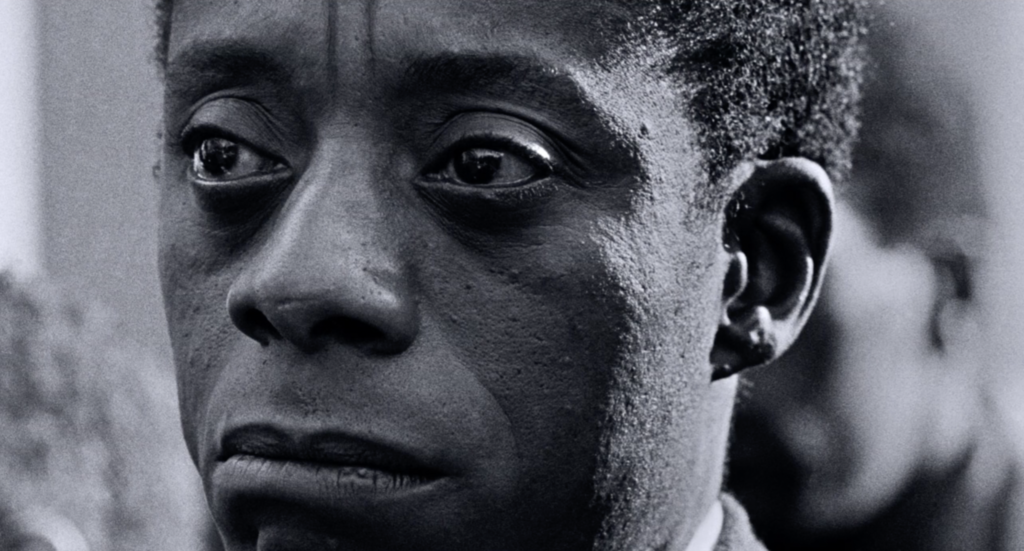Film Matters: Please tell us about your article that is being published in Film Matters.
Emily Heiser: My article examines the critical reception of Raoul Peck’s film I Am Not Your Negro (2017) and how the film’s unique ability to evoke empathy and harness the psychological process of projection could have impacted certain responses. Although I Am Not Your Negro is based on an unfinished book by James Baldwin, he still had no active role in the creation of the film, which is why I was intrigued when I found multiple critics saying that they felt they were in the presence of Baldwin or were immersed in his point of view upon watching the film.
FM: What research and/or methodologies do you incorporate in your article?
EH: My research for this article involved delving into the film’s critical reception and finding similarities among the literature. I incorporate film theory while also taking a psychological approach, which was pleasantly surprising because this was a methodology I hadn’t attempted in any prior scholarly work.
FM: Describe the original context for/when writing this article while an undergraduate student.
EH: This piece was my senior thesis, which I wrote during my last semester of undergraduate studies. We had been studying films centered around the African diaspora and were instructed to write about one of these films. It was so easy to decide that I wanted to examine and write about I Am Not Your Negro. I am such a fan of Peck and find his films incredibly unique and moving, and I am so pleased I’ve gotten the opportunity to publish work about one of his masterpieces.
FM: How have your personal experiences shaped and influenced your writing?
EH: There has always been this large part of my personality that wants to foster understanding between people—whether that’s between me and others, or just between others. I think this played a huge role in my wanting to write about empathy and how to produce more of it in the world. Even though the main medium I want to professionally work with is film, I have always loved writing and find it extremely therapeutic, even in a scholarly setting. There is certainly an art to it, but there’s also something so satisfying about simply laying all your thoughts out in black and white.
FM: What aspects of the writing process were most challenging? Why?
EH: Although I knew that I wanted to write about I Am Not Your Negro, pinpointing exactly what it was about the film and its reception that was speaking to me was difficult. The main argument and concept of the article went through multiple stages before I finally landed on what really felt like an interesting and rich topic to me.
FM: What do you enjoy most about your article?
EH: My article sums up my film studies well. I entered the program wanting to learn how it was that a film could completely change how I perceived and interacted with the world after watching it. My undergraduate studies provided me with the necessary analytical skills, and I got to use those skills to take a stab, in this piece, at how I Am Not Your Negro is so effective. Lastly, and perhaps most importantly, I think the article sounds like me.
FM: How has the Film Matters editorial and publication process impacted the development/evolution of your article?
EH: This process has been a wonderful opportunity to look back at my work with a critical eye and ensure that my writing is as precise as possible. Writing for me involves a balance between being technically correct and maintaining my own personal, human voice. It’s a privilege to have others review my work and make suggestions, and it’s been fascinating to find trends in opinions and takeaways.
FM: What audience do you hope to reach with your Film Matters article and/or what impact do you hope it has on the field of film studies?
EH: I hope this article can help make even a little progress in our understanding of how film evokes empathetic responses in people. I believe so strongly in the importance of empathy in terms of living in a society and just being a human being, and it was film’s power to engender it that made me so attracted to the medium in the first place.
FM: How has your department and/or institution supported your work in film and media?
EH: Ohio State provided me with so many opportunities to hear from and interact with truly inspiring filmmakers. I feel lucky to have left so many events, conversations, or classes feeling reinvigorated and confident in my passion for film.
FM: How has your faculty mentor fostered your advancement as a film scholar?
EH: I felt a lot of trust from Professor Flinn, which gave me space to think creatively when analyzing films, especially when writing this piece. She provided the necessary tools for organizing abstract thoughts, which can otherwise be extremely difficult and draining. I am also grateful to her for introducing me to a world of films surrounding the topic of the African diaspora.
FM: What advice do you have for undergraduate film and media scholars?
EH: Listen to yourself and follow your interests! Really. Drop the expectations of others, as well as your own expectations that those other expectations have influenced, and pay attention to what you are naturally curious about.
FM: What are your future plans?
EH: I plan on using my video production and analytical skills in ways that benefit other people and the planet in some way, whether that’s in an agency, on a film set, or otherwise.
Author Biography
Emily Heiser is a recent graduate of The Ohio State University with a Bachelor of Arts in Film Studies and French. She is primarily interested in video editing and motion graphics, and she hopes to use the powerful tool of video to help others and evoke empathy.




































